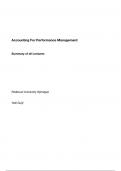Resume
Summary of 'Accounting for Performance Management'
- Cours
- Établissement
Summary of the course 'Accounting for performance management', until this year called 'Management Accounting and Control'. Contains all lectures of this course. MAN-BCU2004
[Montrer plus]



